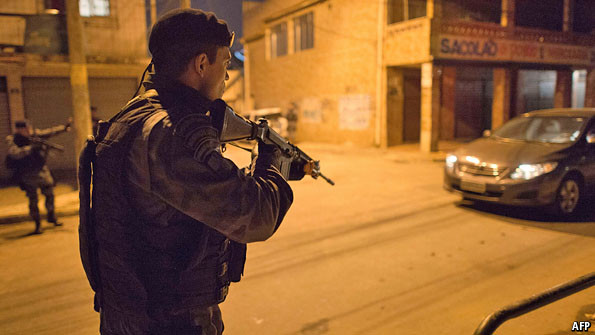21 March 2014 Last updated at 13:56 ET
Rio de Janeiro seeks federal help to quell recent violence

Continue reading the main story Related Stories
The governor of Rio de Janeiro state is meeting Brazil's President Dilma Rousseff to discuss a series of recent attacks against police facilities.
Governor Sergio Cabral is expected to ask for support from federal troops after three police bases were attacked on Thursday.
At least one officer was shot.
The police stations were set up in recent years to push drug dealers out of Rio's favelas or shanty towns, ahead of the football World Cup in June.
Just over a week ago, another policeman was shot dead in a similar attack. Three more have been killed since February.
"It is clear that criminals want to weaken our policy of pacification and take back territories which were in criminal hands for decades," Mr Cabral said ahead of the meeting with Ms Rousseff.
In Manguinhos, a shanty town in the north of Rio, police vehicles were set on fire on Thursday night and the police unit's commander was shot in the leg.
"The state will not back down. The public may be sure we shall act," the governor said.
 Murders are down in Rio's favelas, but residents accuse the police of using heavy-handed tactics
Murders are down in Rio's favelas, but residents accuse the police of using heavy-handed tactics
In the past five years, the authorities in Rio have installed more than 30 police bases in favelas to drive out drug gangs.
Correspondents say murders are down in those areas and the number of shootouts has dropped, but residents there have often accused the police of using heavy-handed tactics.
The BBC's Julia Carneiro in Rio says the deaths of security forces in recent weeks have prompted some groups to express solidarity towards police and their families.
The backlash to the police operations in Rio, Brazil's second largest city, has heightened concerns about law and order ahead of the World Cup, which begins on 12 June.
Seven World Cub matches, including the final, will be played in the city.
It will also host of the 2016 Summer Olympics, the first ever to held in South America.
Rio de Janeiro seeks federal help to quell recent violence

Continue reading the main story Related Stories
- Police car death 'shocks Brazil'
- No speeches at World Cup ceremony
- Rio police train in crowd control
The governor of Rio de Janeiro state is meeting Brazil's President Dilma Rousseff to discuss a series of recent attacks against police facilities.
Governor Sergio Cabral is expected to ask for support from federal troops after three police bases were attacked on Thursday.
At least one officer was shot.
The police stations were set up in recent years to push drug dealers out of Rio's favelas or shanty towns, ahead of the football World Cup in June.
Just over a week ago, another policeman was shot dead in a similar attack. Three more have been killed since February.
"It is clear that criminals want to weaken our policy of pacification and take back territories which were in criminal hands for decades," Mr Cabral said ahead of the meeting with Ms Rousseff.
In Manguinhos, a shanty town in the north of Rio, police vehicles were set on fire on Thursday night and the police unit's commander was shot in the leg.
"The state will not back down. The public may be sure we shall act," the governor said.
 Murders are down in Rio's favelas, but residents accuse the police of using heavy-handed tactics
Murders are down in Rio's favelas, but residents accuse the police of using heavy-handed tactics In the past five years, the authorities in Rio have installed more than 30 police bases in favelas to drive out drug gangs.
Correspondents say murders are down in those areas and the number of shootouts has dropped, but residents there have often accused the police of using heavy-handed tactics.
The BBC's Julia Carneiro in Rio says the deaths of security forces in recent weeks have prompted some groups to express solidarity towards police and their families.
The backlash to the police operations in Rio, Brazil's second largest city, has heightened concerns about law and order ahead of the World Cup, which begins on 12 June.
Seven World Cub matches, including the final, will be played in the city.
It will also host of the 2016 Summer Olympics, the first ever to held in South America.

Comment